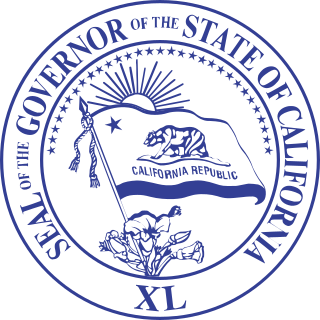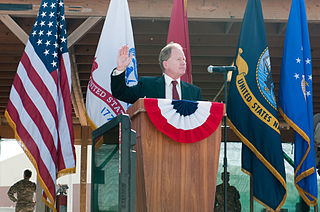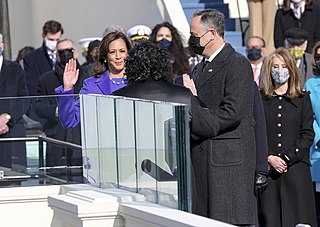Related Research Articles

An oath of office is an oath or affirmation a person takes before assuming the duties of an office, usually a position in government or within a religious body, although such oaths are sometimes required of officers of other organizations. Such oaths are often required by the laws of the state, religious body, or other organization before the person may actually exercise the powers of the office or organization. It may be administered at an inauguration, coronation, enthronement, or other ceremony connected with the taking up of office itself, or it may be administered privately. In some cases it may be administered privately and then repeated during a public ceremony.

Article Six of the United States Constitution establishes the laws and treaties of the United States made in accordance with it as the supreme law of the land, forbids a religious test as a requirement for holding a governmental position, and holds the United States under the Constitution responsible for debts incurred by the United States under the Articles of Confederation.

The governor of California is the head of government of the U.S. state of California. The governor is the commander-in-chief of the California National Guard and the California State Guard.

An oath of allegiance is an oath whereby a subject or citizen acknowledges a duty of allegiance and swears loyalty to a monarch or a country. In modern republics, oaths are sworn to the country in general, or to the country's constitution. For example, officials in the United States, take an oath of office that includes swearing allegiance to the United States Constitution. However, typically in a constitutional monarchy, such as in the United Kingdom, Australia, and other Commonwealth realms, oaths are sworn to the monarch. Armed forces typically require a military oath.

The oath of office of the president of the United States is the oath or affirmation that the president of the United States takes upon assuming office. The wording of the oath is specified in Article II, Section One, Clause 8, of the United States Constitution, and a new president must take it before exercising or carrying out any official powers or duties.

The Canadian Oath of Allegiance is a promise or declaration of fealty to the Canadian monarch—as personification of the Canadian state and its authority, rather than as an individual person—taken, along with other specific oaths of office, by new occupants of various federal and provincial government offices; members of federal, provincial, and municipal police forces; members of the Canadian Armed Forces; and, in some provinces, all lawyers upon admission to the bar. The Oath of Allegiance also makes up the first portion of the Oath of Citizenship, the taking of which is a requirement of obtaining Canadian nationality.

A loyalty oath is a pledge of allegiance to an organization, institution, or state of which an individual is a member. In the United States, such an oath has often indicated that the affiant has not been a member of a particular organization or organizations mentioned in the oath. The U.S. Supreme Court allows the oath to be a form of legal document.
An oath of citizenship is an oath taken by immigrants that officially naturalizes immigrants into citizens. It is often the final step in this process, and is usually done in a ceremonial capacity. An oath of citizenship is designed to be a statement of patriotism and loyalty to the new country. In countries which retain a monarchical system of government, an oath of allegiance to the monarch is often required as well. Adding an oath to God to the end of an oath is usually optional.

The oath of enlistment is a military oath made by members of the United States Armed Forces who enlist.

The Oath of Allegiance is a promise to be loyal to the British monarch, and his or her heirs and successors, sworn by certain public servants in the United Kingdom, and also by newly naturalised subjects in citizenship ceremonies. The current standard wording of the oath of allegiance is set out in the Promissory Oaths Act 1868.

The Oath of Allegiance of the United States is the official oath of allegiance that must be taken and subscribed by every immigrant who wishes to become a United States citizen.
Near the end of the American Civil War, the Ironclad Oath was an oath promoted by Radical Republicans that required federal employees, lawyers, and federal elected officials to swear upon entry of office that they had never supported the Confederacy. The first such law adopted by Congress was in 1862 which attempted to make the oath a requirement for the incoming members of the 38th United States Congress to take the oath. In 1863, President Abraham Lincoln proposed the Ten percent plan, which proposed that a state in rebellion could be reintegrated if a similar oath, with an additional pledge to abide by the nationwide abolition of slavery, was taken by 10% of its voters. Congress then attempted to raise this to 51% of voters in the Wade–Davis Bill of 1864, which Lincoln pocket vetoed on the grounds that it was too harsh. After the assassination of Lincoln in 1865, his successor, Andrew Johnson, opposed the oath altogether. Given the temporary disenfranchisement of the numerous Confederate veterans and local civic leaders, a new Republican biracial coalition came to power in the eleven Southern states during Reconstruction. Southern conservative Democrats were angered to have been disenfranchised.
In Australia, an Oath of Allegiance or an Affirmation of Allegiance are oaths of allegiance required to be made to the monarch of Australia in some situations. Oaths of Allegiance are usually made on a Bible, or some other book holy to the person, such as a Torah or Koran; but the person may opt to make an affirmation in lieu of an oath. This oath is not the same as the Australian Citizenship Pledge which is required to be made when being naturalised as an Australian citizen.
"So help me God" is a phrase often used to give an oath, sometimes optionally as part of an oath of office. It is used in some jurisdictions as an oath for performing a public duty, such as an appearance in court. The phrase implies greater care than usual in the truthfulness of one's testimony or in the performance of one's duty.

AmeriCorps VISTA is a national service program designed to alleviate poverty. President John F. Kennedy originated the idea for VISTA, which was founded as Volunteers in Service to America in 1965, and incorporated into the AmeriCorps network of programs in 1993. VISTA is an acronym for Volunteers in Service to America.

In India, a chief minister is the elected head of government of each state out of the 28 states and sometimes a union territory (UT). Currently, only the UTs of Delhi, Jammu and Kashmir and Puducherry have serving chief ministers. According to the Constitution of India, the governor is a state's head, but de facto executive authority rests with the chief minister.
The Oath of Allegiance is an oath administered to and recited by immigrants who wish to accede to the citizenship of the Republic of the Philippines. The current oath, based on the United States Oath of Allegiance, was first enshrined in Commonwealth Act No. 473, the Revised Naturalization Law of 1939, with the modern version enshrined in Republic Act No. 9225, the Citizenship Retention and Re-acquisition Act of 2003.

The oath of office of the vice president of the United States is the oath or affirmation that the vice president of the United States takes upon assuming the vice-presidency but before beginning the execution of the office. It is the same oath that members of the United States Congress and members of the president's cabinet take upon entering office.

The Penang State Executive Council is the executive authority of the state government of Penang, a Malaysian state. Led by the Chief Minister, the head of government who is appointed by Penang's head of state, the Governor, the Executive Council also comprises between four and ten other State Assemblymen from the Penang State Legislative Assembly, as well as the State Secretary, the State Legal Adviser and the State Financial Officer.
References
- 1 2 5 U.S.C. § 3331, Oath of Office.
- ↑ 10 U.S.C. § 626, Acceptance of promotions; oath of office.
- ↑ National Guard Bureau Form 337 http://www.ngbpdc.ngb.army.mil/forms/ngbf337.htm "Oath of Enlistment". Accessed 24 Jan 2012.
- ↑ Oath of office:
- "Oath of Office" (PDF). Retrieved 15 November 2020.
- "AFI 36-2501" (PDF). 16 July 2004. p. 98. Archived from the original (PDF) on 15 December 2021. Retrieved 15 November 2020. (Attachment 4)
- ↑ "US Military Library, 'Going to War 1861'".
- 1 2 Keskel, Kenneth (2002). "The Oath of Office : A Historical Guide to Moral Leadership" (PDF). Air and Space Power Journal. 16 (4): 47–58. (Table 1 on pp. 49-50)